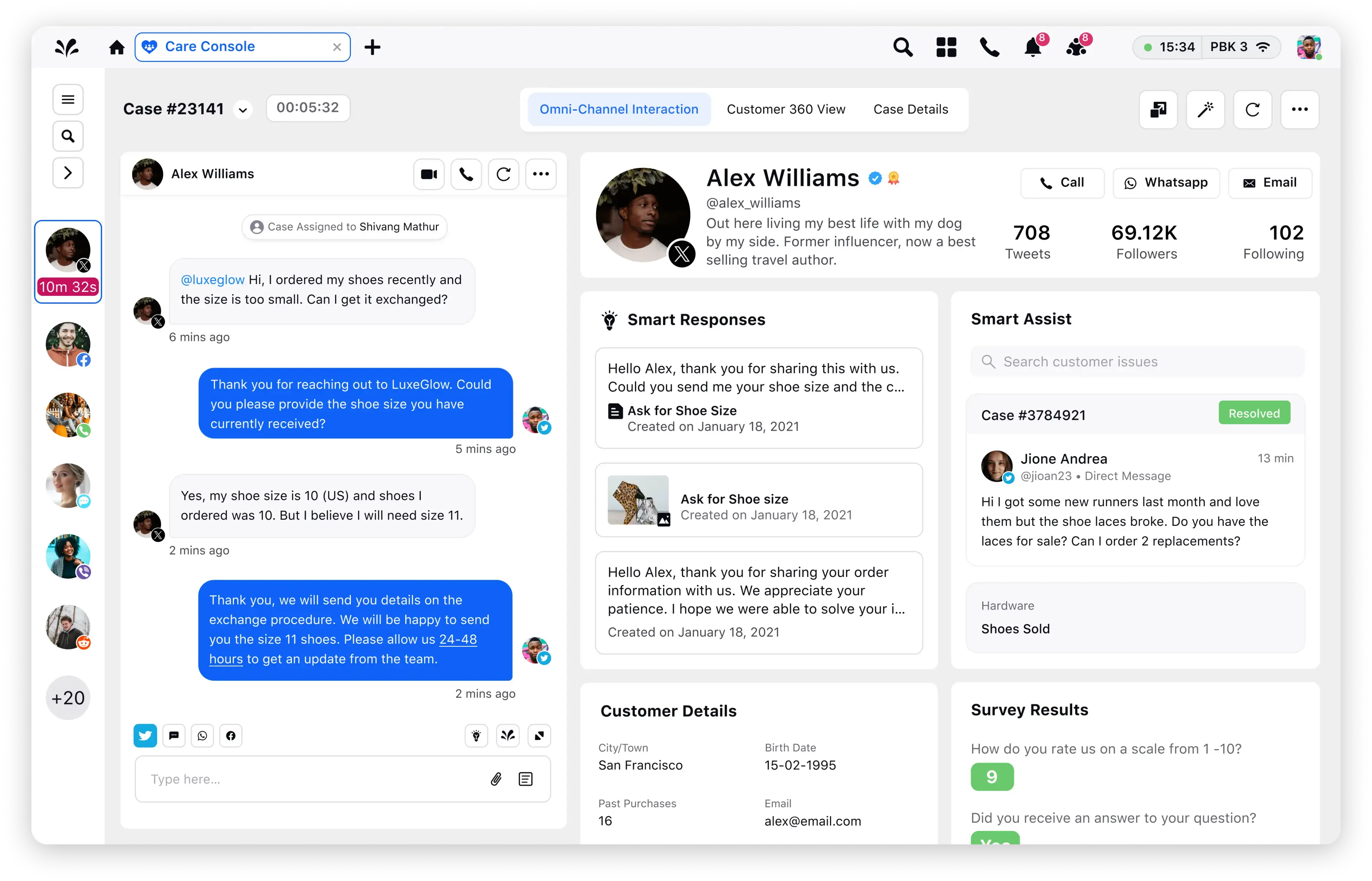The next generation of CCaaS is here
Digital-first customer service, enterprise-scale voice support. Redefine customer service with an AI-powered platform that unifies voice, digital and social channels. Power channel-less interactions and seamless resolution no matter the channel of contact.

Transform contact center agents into superheroes with AI-powered quality management
Quality management (QM) is a mission-critical function and the secret to enhancing customer experiences and boosting productivity. Imagine reducing your average handle time by 10% - 40%. But QM goes beyond efficiency gains.
It also fuels agent engagement, uncovers customer insights, and safeguards against fraud. As contact centers embrace automated or AI-enabled QM (AQM) solutions, one thing is clear: quality management is a must-have for those who prioritize customers, agents, and business outcomes.
Let's explore how implementing quality management solutions can go a long way in upgrading your overall customer experience.
Customer expectations are changing - Is your contact center keeping up
In this era of automation and advanced technology, it's surprising that many contact centers are still stuck with outdated manual quality management processes. This reliance on manual methods causes several challenges and gaps in contact center quality management.
Let's dive into the key challenges.
1. Manual quality check audits are inconsistent and inefficient
Manual ways of quality management are not only time-consuming but also inconsistent due to the inherent risk of human error, bias, and inefficiency. The arduous task of manually auditing interactions can drain valuable resources and hinder productivity.
Without a streamlined quality management (QM) solution, contact centers face an uphill battle in ensuring consistent and objective evaluations of customer interactions.
2. Maintaining a prominent level of quality checks for every contact is challenging
Monitoring customer interactions across support channels for valuable insights presents another significant challenge. Considering the vast volume of customer interactions in contact centers, quality managers can realistically monitor only a small percentage, typically around 10%. Additionally, consolidating, and gleaning insights from spreadsheets is highly inconvenient.
This limited oversight means that critical insights and trends may go unnoticed, leading to missed opportunities for improvement. Without comprehensive monitoring, contact centers fail to grasp customers' needs, pain points, and expectations.
3. Limited avenues to improve agent performance
The task of integrating numerous quality checks from various sources for building an agent coaching plan is humanely impossible. Therefore, contact centers need a comprehensive solution that provides actionable insights and feedback to help agents grow and excel in their roles. Without such a system, contact centers may struggle to identify areas for improvement, provide timely coaching, and foster ongoing development for their agents.
4. Low-cost efficiency
The financial aspect also comes into play when considering the cost associated with manual audits. Even with the ambition to audit a mere 10% of interactions, it would require a significant workforce, potentially consisting of hundreds of individuals. The resource-intensive nature of manual audits can quickly add up in terms of both time and financial investment.
5. A gap in agent-specific routing
One of the key gaps in agent management is the inability to identify individual agent strengths and effectively route specific cases accordingly. Contact centers require a robust QM system that can accurately assess agent capabilities and assign tasks that align with their expertise.
By leveraging the power of AI-powered QM solutions, contact centers can optimize their operations by ensuring the right agents handle the right cases, resulting in enhanced customer experiences and improve overall efficiency.

From reactive to proactive: Powering quality management with AI
It's time for contact centers to shift from a reactive to a proactive customer service approach. And guess what? AI-powered quality management is the notable change that can make it happen. By embracing these key principles, contact centers can revolutionize the quality of customer interactions and take their service to the next level.
1. Customer centricity
AI-powered quality management puts the customer front and center. It enables you to truly understand and meet customers' needs by leveraging advanced analytics and AI algorithms. AI leverages the varied data breadcrumbs customers leave as feedback throughout the journey. With a deep understanding of customer preferences and behavior, your contact centers can delight customers with personalized experiences.
2. Process-based approach
AI-powered quality management optimizes resource allocation through streamlined workflows, bottleneck elimination, and enhanced efficiency and consistency. By automating tasks and intelligently allocating resources, AI optimizes processes and saves time and human effort.
The analytical capabilities empower you to make informed data-driven decisions. Standardized processes enforced by AI ensure precision and compliance, improving quality and customer satisfaction. Overall, AI integration in quality management drives operational performance and business success.
3. Data-driven decision making
Accessing and integrating data from diverse point solutions poses a significant challenge for contact centers, and hinders the ability of agents and managers to gather actionable insights effectively.
But, you can solve this issue by leveraging the power of contact center KPIs.
Real-time access to key performance indicators (KPIs), customer satisfaction (CSAT) scores, and performance insights is a game-changer for contact centers. These real-time insights will help understand which agent has what skills for case routing and helps plan agent coaching plan with required training time.
AI-powered quality management integrates with customer relationship management (CRM) systems, allowing contact centers to make informed data-driven decisions, identify trends and scope of improvement.
4. Agent empowerment
Empowering agents is crucial for delivering exceptional customer service. AI-powered quality management equips agents with the tools (like guided workflows and agent desktop) and insights they need to excel in their roles. By providing agents with real-time feedback, coaching, and access to relevant customer data, contact centers can empower their frontline team to deliver personalized solutions.
5. Operational efficiency
Quality management solution provides granular data based on service level agreements (SLAs), regions, products, and time frames. Moreover, it leverages sentiment analysis capabilities to improve the experience with chatbots and support agents.
Soon the quality management output will become an input for workforce management. It will help in planning the right skilled agents available at the right time with allocated upskilling/training time.
How can Sprinklr help
Sprinklr's AI-powered quality management solution evaluates 100% of your customer conversations using AI-based scoring, real-time voice call transcripts, and key moments’ timelines. It enables you to uncover real-time agent performance and compliance-related insights to deliver contextual, constructive feedback, transforming your support agents to service superheroes.
Role of AI in streamlining quality management
Here's how AI transforms quality management and can impact your contact centers.
1. Automated quality management
Quality management solutions use AI-based scoring to assess the hard and soft skills of agents. By leveraging AI algorithms, you can accurately evaluate agent performance and provide targeted coaching and development to empower them. In addition to providing real-time insights, the QM solution also provides timeline views for both voice and non-voice cases.
For example, Cdiscount leverages Sprinklr's voice analytics capabilities to analyse 100% of its call and digital contact volume, understand customer sentiments and call quality management. The quality management solution enabled Cdiscount to analyse over 800k calls and increase operational efficiency by over 30%.
2. Automated sampling and calibration of manual audit
AI algorithms can be employed by contact centers to select and review interactions, resulting in a notable reduction in the time and effort spent on manual audits. This automation ensures consistency and accuracy in auditing process, leading to more reliable and actionable insights.
3. Robust analytics capabilities
Quality managers, supervisors and executives can access case analytics views to analyse trends, gaps and make informed decisions. Furthermore, AI-powered aggregate-level agent insights provide a comprehensive overview of agent performance, helping contact centers optimize resource allocation and drive continuous improvement.
4. Performance management
AI-powered quality management also supports performance management by offering agent insights and smart alerts. Contact centers can track service level agreements (SLAs) and escalations in real-time, allowing for proactive intervention and resolution. Custom coaching and guidance based on AI-driven insights enables agents to enhance their skills and deliver outstanding customer service.
Sprinklr success story: Mini case-study
A multinational online retailer leverages Sprinklr’s AI-powered quality management tool to get visibility into agent performance and automate their manual audit process.
Challenges
- The customer leverages an audit checklist of 15 parameters to evaluate agent performance
- The quality managers had to invest several man hours reading the entire case conversation
- Due to the above constraints, quality managers could evaluate only 2% of the total closed cases and agent insights were not available
Solution
- Al-model was deployed to analyse 100% cases across Facebook and X, formerly Twitter on 8 parameters such as grammar, empathy, customer experience, troubleshooting and more
- There are clear agent insights available to uncover the scope of improvement and individual strengths
Result
The customer was able to automate 53.3% of their manual quality audit process
In conclusion, AI plays a pivotal role in streamlining quality management in contact centers. Through automated processes, AI-based scoring, comprehensive analytics, and performance management capabilities, contact centers can achieve new levels of efficiency, effectiveness, and customer satisfaction.


